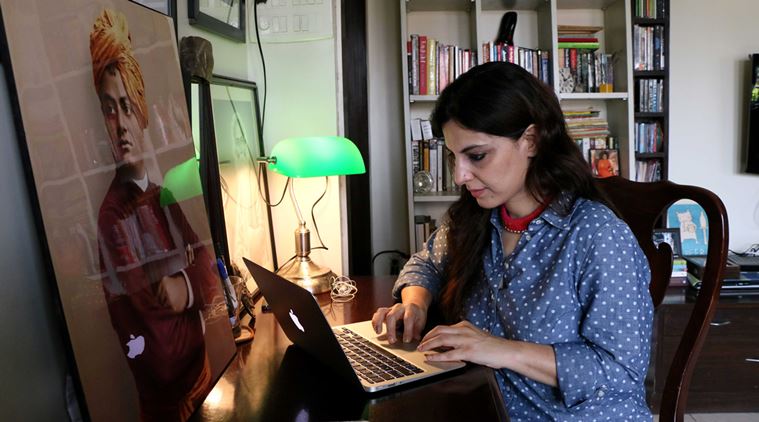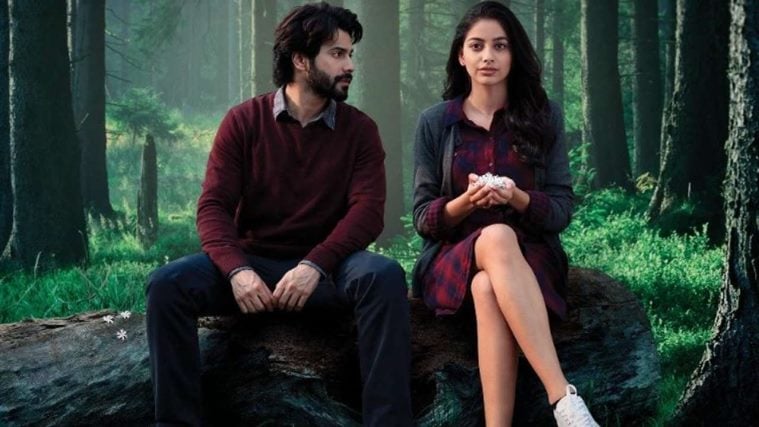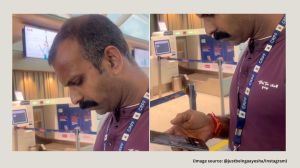Juhi Chaturvedi: The Interpreter of Maladies
In every film, screenwriter Juhi Chaturvedi explores the Indian middle-class family, their troubles and triumphs – and offers a balm for what ails them.
 Writer Juhi Chaturvedi at her residence in Worli. (Express Photo by Amit Chakravarty)
Writer Juhi Chaturvedi at her residence in Worli. (Express Photo by Amit Chakravarty)
Juhi Chaturvedi patiently hears me out as I list all the scenes in her latest film October that didn’t sit right with me. It’s not been an easy morning for her — her house is packed with her family and in-laws, which is why we’re sharing a margherita pizza at Indigo Deli in Lower Parel before her daughter needs to be picked up from school in an hour, and now this — an interviewer who is intent on picking on the gap between intention and execution in a film that has received rave reviews from everybody who matters. But Chaturvedi’s feathers are not ruffled. On the contrary, she laughs loudly when I describe the film as a “rom-coma”. “That’s a good one. Trust me, I’d rather sit with somebody who wants to talk about the film instead of just praising it,” she says, and so we dive right in.
In October, Dan Walia (Varun Dhawan) and Shiuli Iyer (Banita Sandhu) are trainees at a five-star hotel in Delhi. His behaviour is mostly immature, and defiant, while she is careful and sincere. But when she accidentally falls 30 feet from one of the hotel’s terraces, and sustains a terrible brain injury, there’s not much hope left for Shiuli. Her single mother (Gitanjali Rao), her younger siblings rally around her hospital bed, willing her to stay alive; and there’s Dan, who, upon hearing that her last words before the fall were about him, finds that he cannot turn away from the situation. He joins her family in the long wait for a miracle, and when it occurs, in the even longer road to recovery.
Several reviews of October have attempted to unpack if the film is a love story or not. “I’m interested in love but there are so many levels to a male-female relationship, so many energies are at work. Does it always have to end in a kiss, can it not be a friendship or something else? I know I am working in Bollywood, where there is only a handful of women screenwriters, and films which often show a smart woman pleading with a man to understand her feelings,” says Chaturvedi. She makes no bones for her dislike of Bollywood’s popular trope in romantic dramas, the man-child — one who achieves self-realisation only after coming into contact with an emotionally mature woman, bits from his tortured monologues make their way into WhatsApp statuses of urban young men; and when he’s dumbstruck, Arijit Singh takes over.
 A still from October.
A still from October.
In October, Dan could easily be mistaken for yet another man-child, but you’d be wrong, says Chaturvedi. “You may feel that Dan is making this all about himself, but that’s not why I wrote that character. In the hospital, when a nurse asks him if he is family or a boyfriend, and when the answer is neither, he’s asked to leave the ICU. If one does not tick those boxes, or does not belong to an NGO that works with patients, is there a way for them to extend compassion?” she asks, adding, “Dan approaches the life and death balance without really understanding it, but he embodies our desire for hope, in the face of mounting expenses, extended family urging us to pull the plug, and science that doesn’t always have the answers. In this age, is it possible for us to grow into becoming that kind of person?”
The 43-year-old former copywriter speaks from experience: when she was seven years old, her mother survived a haemorrhage, and nothing was ever the same. For the next decade or so, Chaturvedi, her father and brother, did the rounds at the hospital as her mother battled kidney failure, cancer and a transplant. “My mother lived for 30 more years but she suffered. When she died, I was happy that she was finally cured. I painted her nails, applied makeup before the final send-off, because I needed to see her as my mother, and not just a body,” she says.
Since her first collaboration with Shoojit Sircar, who has directed three films written by her, the human body has unwittingly become the site of Chaturvedi’s engagement with empathy. In Vicky Donor (2012), a Delhi man’s life changes overnight after he begins to secretly donate his sperm to a fertility doctor. In Piku (2015), a cantankerous 70-year-old Bengali man’s struggle with constipation colours the lives of all those around him, and October explores different kinds of love and companionship in a setting where words don’t come easily. With all its frailty and deficiencies, the body becomes an avenue through which Chaturvedi tackles themes that are at the heart of her screenplays: the idea of home and family as spaces that offer both sanctuary and entrapment.
“Growing up with my mother’s illness, it was more important for me to be able to depend on a person, than a thing. How our houses run tells us a lot about who we are as people; a place where you can keep account of money spent, things said and unsaid, how time passes differently for each one of us even when we are under the same roof. It’s where we are forced to be honest with each other, in order to survive,” she says. During our conversation, Chaturvedi brings up the word “random” quite often. “I think randomness is very important in our lives. How many of our days, our lives are spent saying very profound things, or very meaningful ones?”
 Varun Dhawan in a still from Shoojit Sircar’s October.
Varun Dhawan in a still from Shoojit Sircar’s October.
“Faltu ki cheezein (Useless things)” is how Sircar describes his conversations with Chaturvedi. “We’ll talk about anything, from cooking to meditation, gardening to cinema, and, through these random conversations, we are constantly studying each other and finding ways to trust each other,” he says. Nearly eight years ago, when Chaturvedi called him out of the blue one night with the story of Vicky Donor, he’d laughed it off. “We’d worked on ads together and she’d written the dialogues for Shoebite (Sircar’s second, unreleased film starring Sarika and Amitabh Bachchan), and here she was calling at 10 pm to talk about a sperm donor. But I called Juhi back the next morning,” says Sircar, who credits Chaturvedi for balancing humour and reality in their films together. “The tone can become slapstick very easily. But Juhi writes several drafts — seven for Piku, four for October — she helps me keep a check on how things can come across to people,” he says.
“To those who want to work with me, I say that I am a hundred per cent yours, but you have to trust me completely. But there are very few people in the industry who will give me that. In Shoojit’s films, 90 per cent of the time, I have a say in the casting. He knows how my dialogues need to be treated, he gets the tone. When he put my name in the credits of the trailer for October, it was a very big deal,” says Chaturvedi. It also helps Sircar, who is as Bengali as they come, that Chaturvedi locates her stories in a milieu that has some Bengali connection, if not being entirely Bengali. “I know I do that, but it’s because the first-floor tenants in the house I grew up in, in Lucknow, were a Bengali family. Lucknow has a robust Bengali population. I spent so much time around them, absorbing their culture and language. When I began watching movies, it was Satyajit Ray, Ritwik Ghatak. My brother married a Bengali, so I guess we’re very comfortable being a part of that community without being born into it,” she says.
 Even after winning several popular film awards, and the National Award for Best Story and dialogue in 2016 for Piku, Juhi Chaturvedi doesn’t quite identify with Bollywood or even Bombay. (Express Photo by Amit Chakravarty)
Even after winning several popular film awards, and the National Award for Best Story and dialogue in 2016 for Piku, Juhi Chaturvedi doesn’t quite identify with Bollywood or even Bombay. (Express Photo by Amit Chakravarty)
Today, with two of her three films becoming hits, (and October making approximately Rs 50 crore in India so far), Chaturvedi is arguably the most commercially successful female screenwriter in Bollywood. But even after winning several popular film awards, and the National Award for Best Story and dialogue in 2016 for Piku, she doesn’t quite identify with Bollywood or even Bombay. “There are three women who live in my society, who I go for walks with every night, they are my friends. I have friends from my art college days. In the industry, I am friends with Varun Grover and some others. I think I set my films in north India, because I can show the change of seasons there, and that’s important to me. So many of my favourite films, like Saeed Mirza’s films, are set in this city, but I don’t know if I can write a film set in Bombay yet, even though it has allowed me to be so much,” she says.


- 01
- 02
- 03
- 04
- 05





























